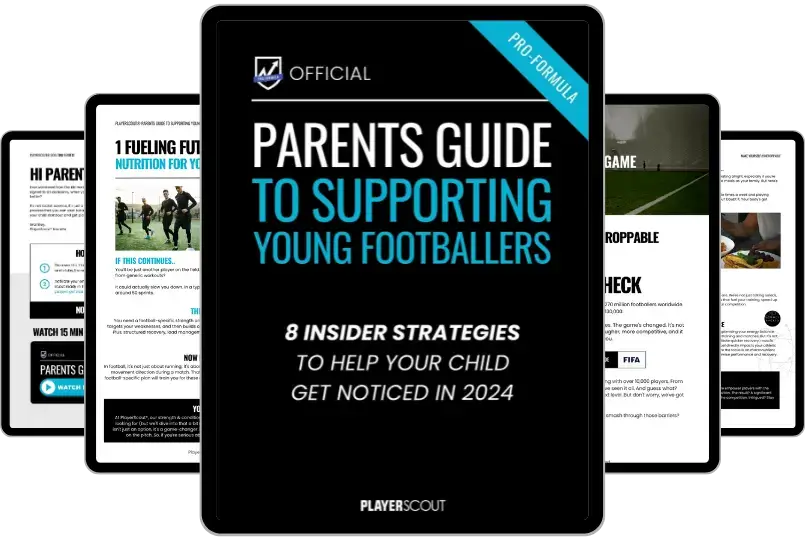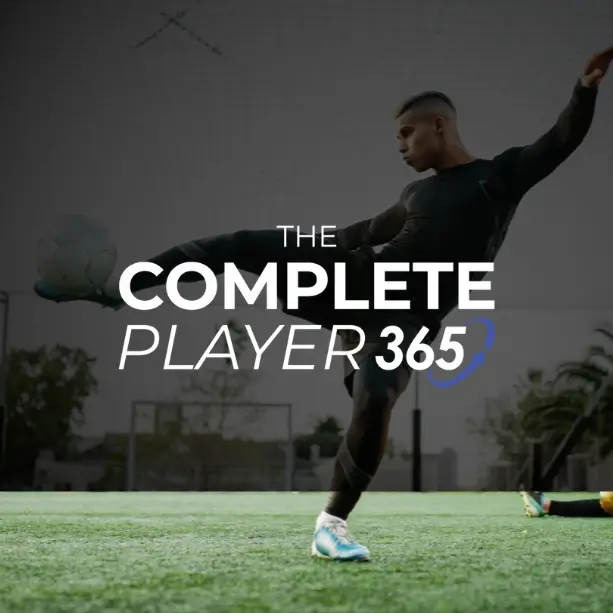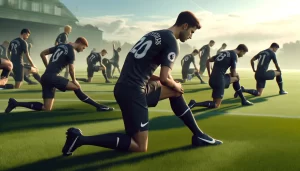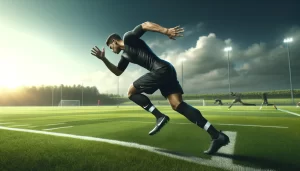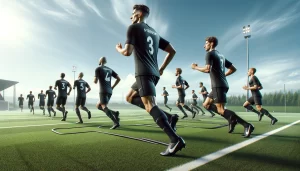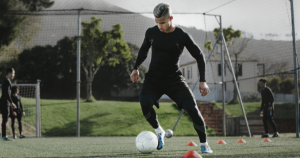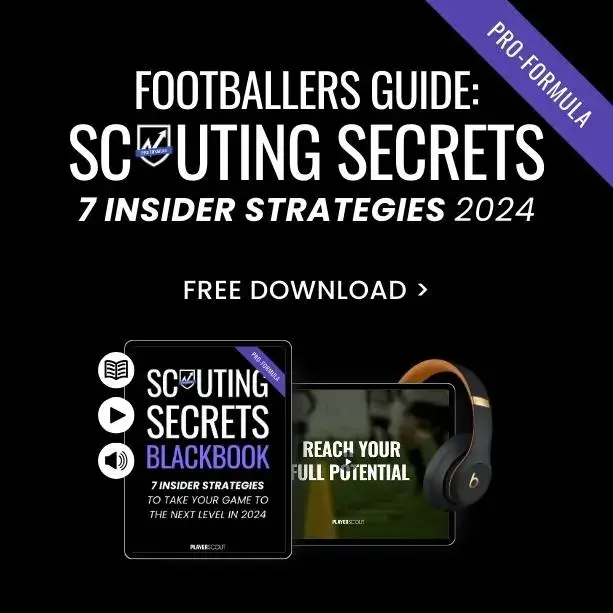Arsenal Academy is the youth department of Premier League football team Arsenal FC. Its main role is to develop young talent to eventually play for the Arsenal first team.
Arsenal’s youth academy provides the network, coaching, health and lifestyle advice that each player needs to make a successful career in football.
Check out the football academies information section for the latest academy articles.
Arsenal Youth Academy’s Main Goal: To produce first team players
Arsenal Youth Academy's Main Goal: To produce first team players
About Arsenal Academy
Arsenal Academy offers an advanced football development and education program supported by expert and dedicated staff. Arsenal Academy address is: Hale End Sports Ground, 99 Wadham Road, London E17 4LUArsenal Academy Stats:
- Number of teams: 9 teams (not including U21 and first team)
- Number of players: 180 (5% from overseas, 95% from the UK)
- Number of coaches: 18 (72 members of youth staff including coaches)
- Preferred Formation: 4-3-3
Arsenal Academy Category Status
Arsenal Academy are rated as a Category One status Academy. Have a general question about football academies, check out out football academies FAQ’s page. With the changes that have taken place in the football academy system. Academy Category One clubs are now free (U12+) to recruit from all over the nation. Previously, Category one clubs could only recruit talent within a 90 minute traveling time to the Academy, but the FA have reconsidered this following thinking that the best talent should only fairly be allowed to play in the best academies even if they do not live nearby. This gives the very best talent the very best chances of success, thus growing our home grown talent for the international stage. This has seen a rise in host families being recruited at Arsenal Academy, to help house young promising talent in safe family environments.Arsenal Academy Fixtures
Arsenal Academy has a whole program of upcoming activities, fixtures, and events. Check the times of each match or look up the match venue for any of the Arsenal Academy age groups.Arsenal FC Academy League Position
Arsenal Academy currently plays in the in the Premier Academy League Group South:, visit to find out how the young gunners are performing this season.Arsenal Academy Honours
Arsenal FC has an extremely successful Academy, performing well in both league and cup for many years. Below are titles Arsenal FC Academy have won:
They have been crowned Premier Academy League Champions 1 time:
- 1998
They have won the FA Youth Cup 7 times:
- 2009: Arsenal FC Academy 6-2 Liverpool FC Academy (aggregate)
- 2001: Arsenal FC Academy 6-3 Blackburn Rovers FC Academy (aggregate)
- 2000: Arsenal FC Academy 5-1 Coventry City FC Academy (aggregate)
- 1994: Arsenal FC Academy 5-3 Millwall FC Academy (aggregate)
- 1988: Arsenal FC Academy 6-1 Doncaster Rovers FC Academy (aggregate)
- 1971: Arsenal FC Academy 2-0 Cardiff City FC Academy (aggregate)
- 1966: Arsenal FC Academy 5-3 Sunderland FC Academy (aggregate)
They have won the FA National Academy Play-off (U17) 1 time:
- 2000
Winners of the FA National Academy Final (U18) 1 time:
- 2009/2010
Winners of the FA National Academy Final (U19) 1 time:
- 2002
Winners of the South East Counties League 1 time:
- 1991
Winners of the Southern Junior Cup 5 times:
- 1998
- 1991
- 1984
- 1971
- 1956
Arsenal Academy Trials
A large number of upcoming football players search for information on how to join Arsenal football Academy? There are many avenues to joining Arsenal Academy, however, the most common is being selected for an Arsenal football trial at a young age, then working your way through the Academy system. For some players, they prefer a direct approach sending links to videos of themselves playing football. However… You must bear in mind that clubs receive thousands of videos each week and simply don’t have time to watch them all, so the most effective way of getting scouted for a trial at Arsenal Academy is to join an Arsenal Soccer School. Scouts regularly select young players from soccer school sessions and invite them to trial at the development centers. Anyone can attend a soccer school, so it opens doors for all to get spotted. It is also particularly good planning to take your child to soccer schools as soon as they are old enough, as their competition will be doing the same, so it enables them to develop their talents in line with the same level as their peers. Find out how to get scouted hereHow to get spotted by an Arsenal Academy scout
Arsenal need to be very efficient with their academy scouting efforts, due to the extreme competition in the London area. There are currently 14 professional clubs throughout London and its suburbs.
The Academy staff offer players with potential the chance of a 6-week trial with the Academy. Many players are lucky enough to find themselves in the right places when scouts are watching games, however, Arsenal Academy is also very aware that good talent can slip through the net, so do offer players the chances to directly contact the club with their playing profile. For information on how to present your playing career in the correct manner, check out ourFootball CV page.
Understandably they are unable to respond to everybody due to the volume of applications, but this does serve as an effective way to alert scouts about talent looking to take their football to the next level and secure a trial for Arsenal Academy.
To get scouted for a trial at Arsenal Academy simply collect the following information:
- Football CV
- Covering Letter
- Player Vital Statistics: Players position, Age, Date of Birth, Height, Weight, contact email/phone/address, current club, previous clubs, detail of any trials already attended, any representative honours such as school, districts, county etc
- Players school
- Fixture list of your current team, including location and kick off time to be passed to scout
Once you have collated all of the above information, email Arsenal Academy via this address:
- ask@arsenal.co.uk
Arsenal Academy will assess your application and decide whether or not to send a scout to watch the game.
Arsenal Academy Players
To find out all about the current crop of talent, visit the Arsenal Academy players page.Arsenal Academy Graduates
Here are some of the high profile Arsenal Academy graduates from over the years:- Andy Cole
- Armand Traoré
- Arthur Milton
- Ashley Cole
- Cesc Fàbregas
- Charlie George
- David Bentley
- David O’Leary
- David Rocastle
- Emmanuel Frimpong
- Frank Stapleton
- Graham Rix
- Jack Wilshere
- Jay Bothroyd
- Johan Djourou
- John Radford
- Kieran Gibbs
- Len Shackleton
- Leslie Compton
- Liam Brady
- Martin Keown
- Michael Thomas
- Niall Quinn
- Nicklas Bendtner
- Pat Rice
- Paul Dickov
- Paul Merson
- Peter Storey
- Quincy Owusu-Abeyie
- Ray Kennedy
- Ray Parlour
- Richard Hughes
- Sebastian Larsson
- Steve Morrow
- Terry Neill
- Tony Adams
- Wojciech Szczęsny
Arsenal Academy Staff
Arsenal Academy Coaches
Arsenal prefer for their coaches to have playing experience for Arsenal at the highest level. The main reason for this is because these former players are already aware of the clubs identity. Their main responsibilities are creating the content of training sessions. For information on the dedicated people behind the development of the academy players, check out the Arsenal Academy staff page.Arsenal Academy Facilities
Arsenal FC has two training complexes:Hale End Training Ground:
Home to age groups 8-16 years (Mainly players from London) 1 artificial pitch and 5 Natural pitchesLondon Colney Training Ground:
Home to players 16 above to the first team 11 pitches Split into 3 areas: Area 1 for the senior team, area 2 for the reserve team and area 3 for the U17 and U18 teams. Facilities:- 3 pitches with under-soil heating
- Changing rooms
- Swimming pool
- Fitness room
- Restaurant
- Several Conference rooms
- Indoor football pitch
Arsenal Academy Jobs
Arsenal Academy are always searching for the best talent on and off the field, if you would like to work for a category one Academy, then keep an eye on the official Arsenal Academy jobs page.Arsenal Academy Progression
Each academy age category is made up of around 25 players, with u19 – u20 whittle down to only 20 players. Arsenal have strict policy of which players progress to London Colney, ensuring only top talent makes it. Once they have successful progresses to London Colney, they are provided with professional:- Coaching
- Physiotherapy
- Reconditioning
- Education
Arsenal Academy Training Strategy (Hale End)
Under 9 – Under 11’s This stage is aimed toward introducing players to organized training and playing games on a weekend. These games are played in teams of:- 5 a side
- 6 a side
- 7 a side
- Speed
- Agility
- Technique
- Dexterity
- Tactical work is starting at 14 years
Arsenal Academy Training Strategy (London Colney)
Under 17 – Under 21’s This stage is when a player is prepared for a professional career in football. From age 17 players start to train every day. Players have breakfast and then training start around 9 am. Most days consist of a morning training session before lunch, and then lessons in the afternoon. However twice a week the players will take part in two training session, with the morning focusing on individual training and the afternoon more team focused. Every arsenal is trained at playing at a high tempo with a football, concentrating on passing drills and interceptions.Arsenal Academy Player Education
Arsenal FC ensures all of their players concentrate on academic studies as well as football. With this in mind, they ensure players under the age 16 live in London so they can attend Hale End easily from school. As players reach 16+ they begin a government designed education program which is similar to two A levels. This focuses on:- English
- Finance
- Social Media
- Social Behavior
- Attitude to training
- Sports science
- Coaching qualifications (F.A level 2 and 3)
Lorem ipsum dolor sit amet, consectetur adipiscing elit. Ut elit tellus, luctus nec ullamcorper mattis, pulvinar dapibus leo.
Syllabus at Arsenal Academy
The training programme at Arsenal Academy is broken into technical and tactical training, with a special module for Goalkeepers. The below demonstrates:- The professional development phase at the Arsenal Academy
- The youth development phase at the Arsenal Academy
- The foundation phase at the Arsenal Academy
- The youth / professional development phase at the Arsenal Academy
- The foundation development goalkeeper phase at the Arsenal Academy
Professional Development Phase at Arsenal Academy
Outfield Players – Technical
- Passing – Playing forwards through tight passing channels
- Receiving the ball – Receiving the ball in the air to pass in the least number of touches
- Passing – Generic passing practises to move the ball on two touches
- Running / Dribbling with the ball – Developing the 1st touch to break through a variation of receiving surfaces
- Running / Dribbling with the ball – Variations in the dribble to advance in 1 v 1’s
- Shooting – Shifting the ball to get shots off under pressure
- Passing – Keeping the ball moving for a long period of time
- Manipulating the ball – Shifting the ball across the body with a variation of surfaces
- Turning – Turning away from pressure and protecting possession of the ball
Outfield Players – Tactical
- Possession (Playing out from the back) – Midfield rotation to receive high and low open up passing channels
- Possession (Retaining the ball to penetrate) – Working in front or behind opponents to retain the ball looking to play forwards
- Possession (Game management) – Playing with and against an overload (the extra man)
- Attacking (Counter attacking) – Breaking from the defending third
- Attacking (Centrally) – Playing between lines and breaking lines with and without the ball
- Attacking (Wide areas) – 1 v 1’s, 2 v 2’s to create goalkeeping opportunities
- Defending (Individual) – Approach to the ball dependent on the opposition and area of the pitch
- Defending (Groups & Units) – Defending later and deeper
- Defending (Making play predictable, Regains and Possession Decision) – Pressure as the team/group hunting the ball for quick regain
Goalkeepers
- Goalkeeper support – Variety of passes and support for players in possession
- Goalkeeper support – Awareness of best option looking to penetrate with distribution
- Goalkeeper support – How the goalkeeper can affect the state of the game
- Goalkeeper defending – How to deal with 1 v 1 situations in game situations
- Goalkeeper defending – Early shots always being set in and around the box
- Goalkeeper defending – Positioning and decision making in dealing with the cross
- Goalkeeper communications – Organisation and support to the defender
- Goalkeeper communications – Communications to players away from the ball
- Goalkeeper communications – Developing the goalkeeper to compact
Foundation Phase at Arsenal Academy
Outfield Players – Technical
- Protecting the Ball – Setting the scene for receiving on the safe side – guidelines for success
- Passing – Short, quick and high tempo passing in small groups
- Receiving the Ball- Developing the set as part of link play to move the ball forwards
- Turning – Developing turns under passive pressure to include disguise
- Shooting – Longer distance shooting relevant to the age of the group
- Running / Dribbling With the Ball – Long and thin practices to practice breaking into space from a dribble or receiving the ball
- Shooting – One touch finishing around the goal on angles with pressure approaching
- Passing – Passing within larger areas focusing on techniques to a longer pass (floor / aerially)
- Manipulating the Ball – Quick foot movements to manipulate a small skills ball
Outfield Players – Tactical
- Possession (Individual) – Developing players to receive the ball and maintain possession on their safe side
- Possession (Group Play) – Develop players to receive and play away from pressure in small groups
- Possession (Directional) – Possession / wave practises maintaining the speed of the ball from start to finish
- Attacking (Individual) – Changes of direction and speed to beat opponents
- Attacking (Groups) – Small group attacking practices (4v4, 5v5). Movement/combinations to create and exploit space
- Attacking (with/against overloads) – Small sided games working on creating and exploiting space on the transition
- Defending (Pressure the Ball) – Basic principles to approaching a player in possession
- Defending (Small Groups) – Possession based practices focusing the change of roles based on the movement of the ball
- Defending (Regaining to Play) – Regaining the ball and countering to a scoring conclusion
Goalkeepers
- Goalkeeper support – Passes and throws to start play
- Goalkeeper support – Choosing the best distribution option
- Goalkeeper support – Using the ball quickly after making a save
- Goalkeeper defending – Throw ball situations and close range shots
- Goalkeeper defending – Attacking the ball and parrying away to safe areas
- Goalkeeper defending – Making recovery saves within the game
- Goalkeeper communications – To defenders individually and as part of a unit
- Goalkeeper communications – Developing the ability to be clear and concise
- Goalkeeper communications – Start positions in relation to the ball
Goalkeeper Youth / Professional Phase at Arsenal Academy
Goalkeepers – Technical
- Distribution – Out of the back to the best option and supporting the play
- Crossing – Dealing with deep crosses into the 18 yard box and transition to distribute
- Shot Stopping – Into line and down the line of the ball for angled strike
- Handling – Dealing with low balls around the set position inclusive of the 1v1 encounter
- Shot Stopping – Dealing with low, medium and high dives from a central and angled strike
- Crossing – Dealing with crosses centrally and to front post areas
- Shot Stopping – Dealing with close reaction shots, double and triple saves
- Distribution – Technique of starting counter attacks, choice of delivery
- Crosses – Dealing with crosses centrally and to the back post area
Goalkeepers – Tactical
- Goalkeeper support – Start play using a variety of passes and providing angles for support for players in possession
- Goalkeeper support – Awareness of best option looking to penetrate with distribution
- Goalkeeper support – Managing the game and understanding how the goalkeeper can affect the state of the game
- Goalkeeper defending – Dealing with 1v1 game situations
- Goalkeeper defending – Dealing with early shots always being set in and around the box
- Goalkeeper defending – Positioning in relation to the ball, decision making on dealing with the cross
- Goalkeeper communications – Organisation and support to the defender (clear and concise information)
- Goalkeeper communications – Communications to players away from the ball
- Goalkeeper communications – Developing the goalkeeper to compact play through the line taken by the defending players
Goalkeeper Foundation Phase at Arsenal Academy
Goalkeepers – Technical
- Handling – Footwork set in position with a variation of serves
- Distribution – Playing out from the back from feet and hands, providing angels of support
- Handling – Variation of handling practices concluding with penetrative distribution
- Shot Stopping – Dealing with 1v1 encounter
- Shot Stopping – Low, medium and high diving sales from central
- Distribution – Technique of longer distribution for feet and hands (classic counter attacks)
- Shot Stopping – Speed of movement across the goal in the line down the line of the ball for an angled strike
- Handling – Technique of dealing with low balls in and around the body
- Crossing – Basic technique and positioning (in relation to the ball) covering balls into front middle far areas
Goalkeepers – Tactical
- Goalkeeper support – Using a variety of passes and throws to start play
- Goalkeeper support – Choosing the best distribution option
- Goalkeeper support – Using the ball quickly after making a save
- Goalkeeper defending – Dealing with through ball situations and learning how to deal with cross range shots
- Goalkeeper defending – Attacking the ball and parrying away to safe areas in game situations
- Goalkeeper defending – Making recovery saves within the game
- Goalkeeper communications – Communication to defenders individually and as a unit
- Goalkeeper communications – Developing the ability to be clear and concise
- Goalkeeper communications – Set positions in relation to the ball



